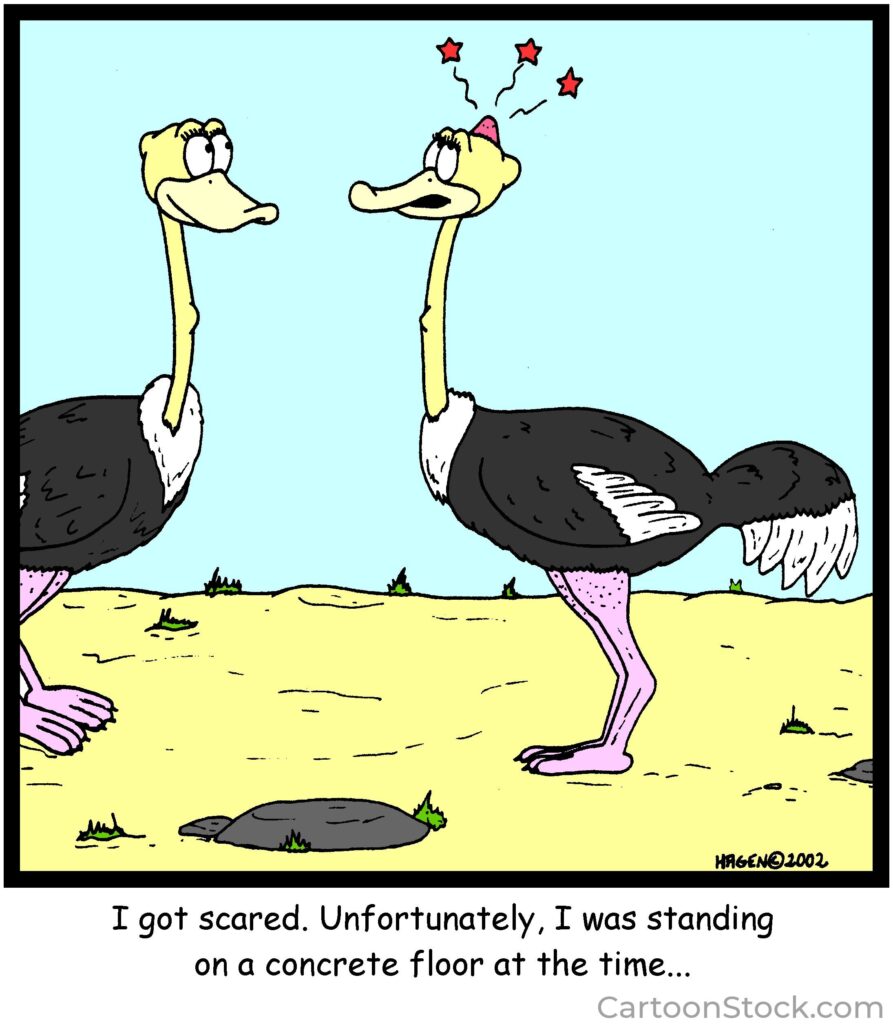
For the last 14 months of its life, the check engine light in my old Subaru Forester (230,000 miles) was constantly on. I would fix one issue that triggered the alarm and then another would flare up. I became so weary of the issue that I didn’t even want to have it checked out. I just ignored the light and would have disconnected it had I known how to.
Years ago (before Mary and I vowed to live debt-free) when our credit card bill would get out of hand, I avoided checking the balance because I knew it was high and out of control.
In both cases, I was exhibiting the ostrich effect (OE).
According to a persistent myth, ostriches bury their heads in the sand when they’re scared or feel threatened. They think they are safe if they can’t see the danger. (They don’t really do that.)
The ostrich effect is a cognitive bias that causes people to avoid information that they perceive as potentially unpleasant. From a psychological standpoint, OE is the result of the conflict between what our rational mind knows to be important and what our emotional mind anticipates will be painful. Instead of helping, it drains us of time, energy, and resources and offers nothing of value in return.
Here are some examples of the ostrich effect
-
-
- You may hesitate to weigh yourself on a scale because you know you’re not sticking to your diet.
- You may avoid getting a professional medical diagnosis because you’re afraid of hearing bad news).
- You regularly check your retirement fund when the market is going up but not when it’s going down (although, to manage your money wisely, you need consistent data).
- Parents may hesitate to have a child who is having trouble in school tested.
- A business executive may postpone delving into what may be problems in the organization.
-
As is often the case with cognitive biases, the first step towards clarity is self-awareness. We must realize and admit that we’re falling prey to unhealthy thinking. I think the ostrich effect is one of the easiest biases to recognize: Just identify areas in your life in which you’re procrastinating or reluctant to get information because you think it might be bad news.
The antidote to the ostrich effect is also simple and straightforward: Immediately pursue areas that you’re avoiding and pursue them aggressively. Put them at the top of your to-do-list; pledge that you’ll not eat again until you address the issues :).
The ostrich effect offers no value—there’s no upside—but overcoming it is very beneficial. As the Bible says, “The truth will set you free,” even if the truth is unpalatable
Travel with Friends Information Meeting
Join me on March 11, 7:00p.m. CST for a 45-minute information meeting on Zoom about the 2024 Travel with Friends trip to the Baltic Sea and Northern Europe.
We’ll discuss the itinerary, accommodations, and ports of calls. The Q&A will answer all your questions. If you want to attend, let me know and I’ll send you an invitation. You can download Zoom for free. You can also participate via a conference call using your mobile phone.
Here’s the brochure that we’ll discuss. Baltic-Sea-Trip-2024-Brochure-110823-Fillable
If you want to attend, email me at djmcminn@msn.com or call me at 214.783.4414

I think we have all probably been guilty of avoiding those issues which might cause us concern or distress.
Sadly there are organisations who produce adverts that make us even more fearful and less likely to address a potential risk. Currently there is a UK TV advert about dementia which would frighten most people so much that they would prefer to hope their symptoms would go away.
Many of us have overfull email inboxes and by going to the other extreme, of looking at every email, we may “bog ourselves down” in minutia when we need to prioritise the most urgent. I find having a few days away can send me into a panic that I have missed something essential. I have spoken to friends who are quite happy to have 1,000 unread emails. I can’t believe there isn’t one important one in there.
When we lived in more paternal times, we expected our bank manager to call us if our overdraft was increasing with every month. Relationships have been lost in on line transactions and the responsibility comes down to us as individuals. Many people in the UK now find it increasingly difficult to make an appointment to see their doctor and this can be an excuse for not seeking investigation and treatment of potentially dangerous conditions. Add to this “reforms” which have made it easier to gamble and on line suppliers that don’t question why we are buying a product and some of the checks and balances that once existed have now disappeared. We are more able to be “our own worst enemy” than ever before.
As always, Angela, I value your thoughts. Our world has become more complicated with increased opportunities to be derailed. I’m glad I’m 71…but fear for my two grandchildren (ages 9 and 4 months).
I’ve never asked you (and don’t feel obliged to respond); what are your thoughts about Brexit?
Don